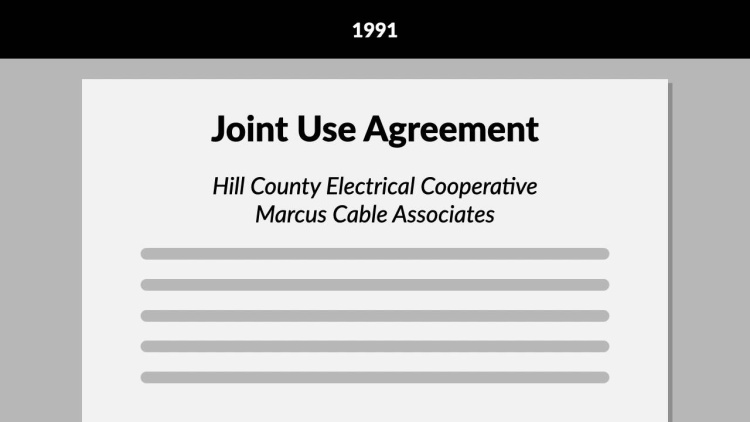Marcus Cable Associates, L.P. v. Krohn
Texas Supreme Court
90 S.W.3d 697 (2002)
- Written by Anjali Bhat, JD
Facts
In 1939, the predecessors in interest of Alan and Myrna Krohn (plaintiffs) granted an express easement to Hill County Electric Cooperative (Hill County Electric). The easement allowed Hill County Electric to use the property to construct and maintain “an electric transmission or distribution line or system.” Hill County Electric entered into a joint-use agreement with a cable-television provider in 1991. The cable-television provider later assigned its rights under the agreement to Marcus Cable Associates, L.P. (Marcus Cable) (defendant). Under the agreement, Marcus Cable could attach its cable lines to Hill County Electric’s poles. The Krohns sued Marcus Cable seven years later, alleging Marcus Cable did not have a valid easement and had negligently placed its wires over the Krohns’ property without the Krohns’ knowledge or consent. The Krohns sought an injunction, ordering Marcus Cable to remove the cable wires, and actual and exemplary damages. Marcus Cable argued it had a right to use Hill County Electric’s poles under Hill County Electric’s easement for the use of the Krohns’ property. The trial court granted summary judgment for Marcus Cable. The court of appeals reversed, and Marcus Cable appealed to the Texas Supreme Court.
Rule of Law
Issue
Holding and Reasoning (O’Neill, J.)
Dissent (Hecht, J.)
What to do next…
Here's why 907,000 law students have relied on our case briefs:
- Written by law professors and practitioners, not other law students. 47,100 briefs, keyed to 996 casebooks. Top-notch customer support.
- The right amount of information, includes the facts, issues, rule of law, holding and reasoning, and any concurrences and dissents.
- Access in your classes, works on your mobile and tablet. Massive library of related video lessons and high quality multiple-choice questions.
- Easy to use, uniform format for every case brief. Written in plain English, not in legalese. Our briefs summarize and simplify; they don’t just repeat the court’s language.





